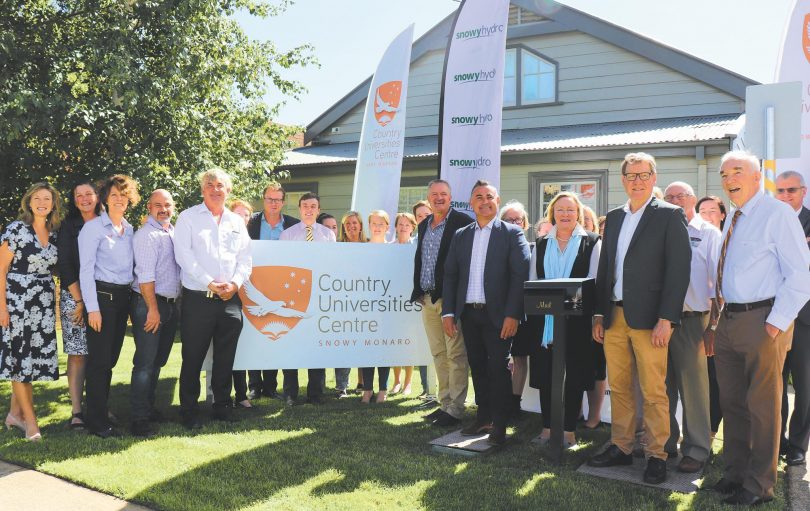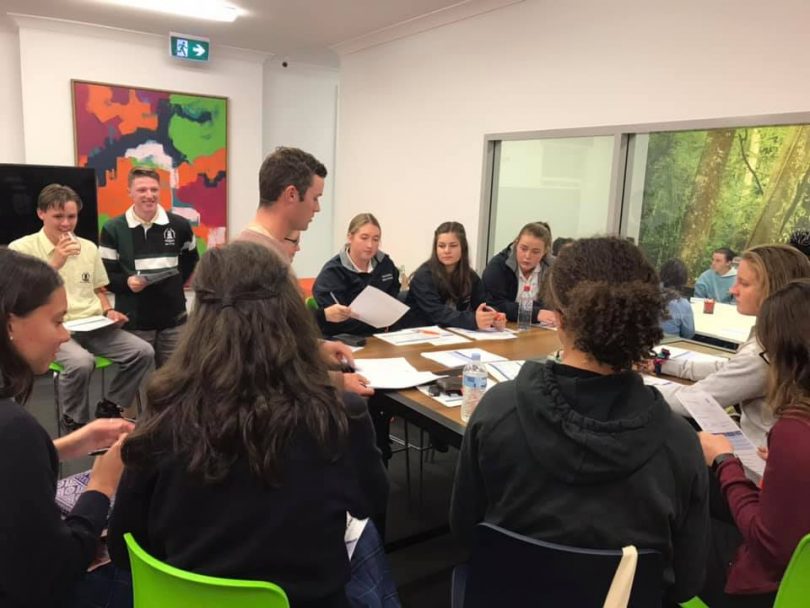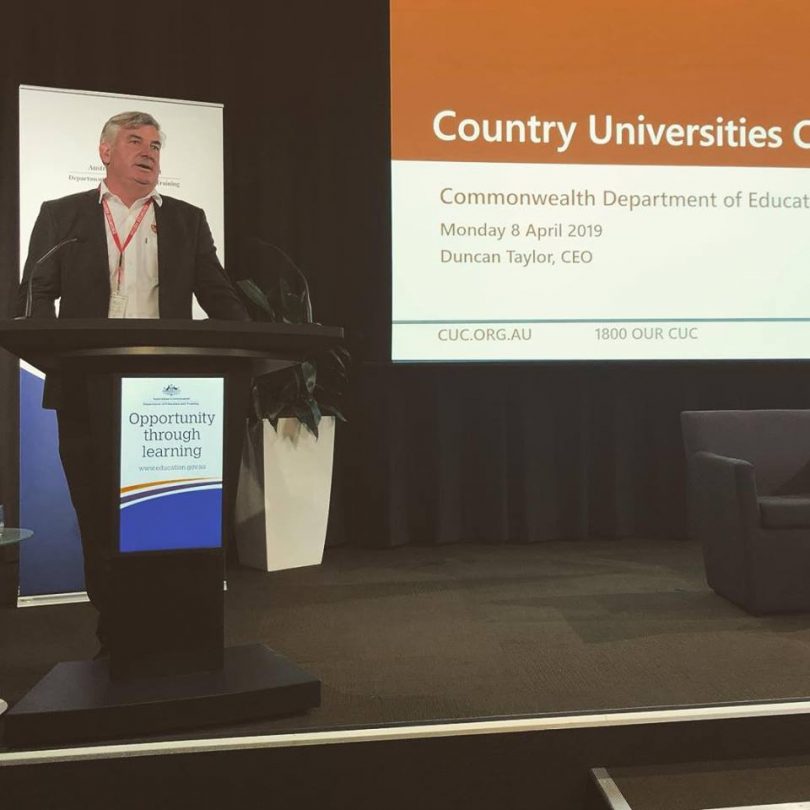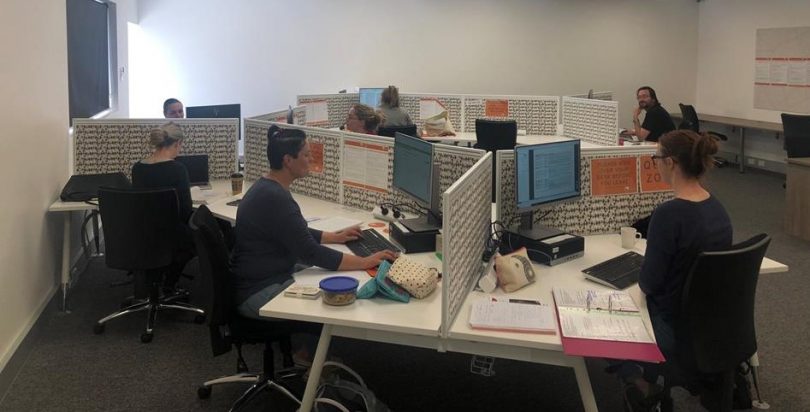
John Barilaro (front right) announcing $8 million for CUC in Cooma last February, Duncan Taylor (centre left). Photo: CUC Facebook.
Duncan Taylor is confident the Country Universities Centre (CUC) he helped pioneer will prove its value to New South Wales beyond the standard matrix of worth.
The CUC scheme was launched in Cooma in 2013, a Snowy Monaro initiative that has grown to include campuses at Broken Hill and Goulburn in the last 12 months, with plans for more of these regional study hubs including in Grafton, Moree, and Narrabri.
The centres allow students to access high-speed technology, campus-like facilities, a broader range of university degree pathways, strong tutorial support, and the ability to source mentors and/or job opportunities through CUC’s industry partnerships.
They are a home base for a range of distance education opportunities offered by traditional universities.
But the scheme has become embroiled in a political stink in the last 10 days amid suggestions two $8 million grants from the NSW Government came as a result of favours for mates and without due process.

Goulburn highschoolers in action at CUC Goulburn. Photo: CUC Facebook.
According to The Guardian, NSW Treasury papers suggest that CUC funding submission “failed a cost-benefit analysis.”
“The latest documents show [John] Barilaro [Deputy Premier and Nationals Member for Monaro] pushed for the Country Universities project to be funded even though the 2016 analysis found the proposal to set up five study centres in country NSW would not deliver value for money for the taxpayer,” The Guardian reports.
The story deepens with the knowledge that Nationals MP Bronnie Taylor is married to CUC Cheif Executive Officer Duncan Taylor and was Parliamentary Secretary to John Barilaro at the time.
Duncan Taylor is also the brother of the Federal Energy Minister and Member for Hume (Goulburn) Angus Taylor.
Aside from the $16 million in funding from the NSW Government, the CUC was also successful in securing $5.1 million in Commonwealth funding last year.
Bronnie Taylor, Angus Taylor, and John Barilaro have all denied any wrongdoing. Duncan Taylor says his family is very aware of its political connections and any dealings involving public funds “happened at arm’s length.”

Duncan Taylor, addressing the Federal Department of Education in April this year. Photo: CUC Facebook.
While the allocation of the State funds did not go through an open tender process, Duncan Taylor says the community can be reassured of the rigour, review and time that was involved.
“We went through an arduous process involving discussions with the Department which led to a formal proposal and then there was a period of many months where there was continuing provision of information and modelling, and facts and figures to the Education Department,” he says.
“The time period was longer than the time period for the Federal funding application which was an open tender round. Our proposals for the NSW funding were just as comprehensive as they were for the Federal open tender process.”
NSW Shadow Treasurer, Labor’s Walt Secord is calling for an investigation, questioning why the Government did not run a tender for the grants.
“It is clear the decision and funding to support the CUC was made without any due diligence and made against treasury advice,” Mr Secord told the ABC.
“This is about the National Party refusing to follow their own treasury rules and not engaging in proper due process.”

Students at CUC Far West/Broken Hill. Photo: CUC Facebook.
Duncan Taylor says Federal Labor also saw value in the CUC model during the recent election campaign.
“Tanya Plibersek had an election commitment for the Federal ALP to support community-owned regional study hubs,” he says.
“The sixteen study hubs to be funded by the ALP if elected included six CUCs, plus she was going to fund six new hubs.”
Mr Taylor says he regrets that political interests have overshadowed what has been and what is being achieved by the volunteer-run CUC.
“People just don’t do university courses for financial gain – we have an enormous diversity of things being studied, well over 100 different degrees across 35 different universities,” he says.
“Some of those are career-driven, others are for community and personal enrichment. Once that knowledge goes into the community it stays and enriches the community.
“Three-quarters of regional university students that go away to a university campus never return – there is a migration of academic and economic skill. Pathways through the CUC will fill local workforce needs and signal to the community job opportunities.
“For too many years our youth have been told or had the notion that to be successful they have to leave their communities.
“That is really demoralising for country communities. If you can keep some youth in town, then other parts of community life benefit – sporting teams for example.”
In 2018, the three CUCs currently operating, accounted to 292 students. Four new campuses are currently being planned.
Operating and expanding on the back of public funds brings with it ongoing evaluation and reporting, Mr Taylor says.
“Any evidence at this stage is early and because a lot of our students study part-time, with work and family responsibilities, it can take six to eight years to complete a degree, but I think there is plenty of reason to believe our model will be a success.”







